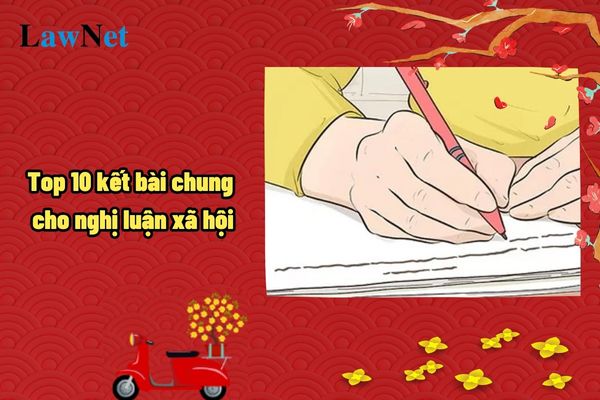What are the Top 10 common conclusions for social argumentation essays for excellent students in Vietnam? Will 10th-grade students in Vietnam study errors in word usage and corrections in the Literature curriculum?
What are the Top 10 common conclusions for social argumentation essays for excellent students in Vietnam?
Students can refer to the following Top 10 common conclusions for social argumentation essays for excellent students in Vietnam:
|
Top 10 common conclusions for social argumentation essays for excellent students in Vietnam 1. Conclusion with expansion, practical association: |
Note: Information is for reference only./.

What are the Top 10 common conclusions for social argumentation essays for excellent students in Vietnam? Will 10th-grade students in Vietnam study errors in word usage and corrections in the Literature curriculum? (Image from the Internet)
Will 10th-grade students in Vietnam study errors in word usage and corrections in the Literature curriculum?
Under Section 5 of the General Education Program for Literature issued with Circular 32/2018/TT-BGDDT regulating Vietnamese knowledge in the 10th-grade Literature curriculum:
- Errors in word usage and corrections
- Errors in word order and corrections
- Rhetorical devices such as insertion, enumeration: characteristics and effects
- Errors in linking paragraphs and texts: identification signs and corrections
- Text types and genres
+ Argumentative text: purpose, writer's perspective; organization and presentation of arguments, reasoning, and evidence; narrative and expressive elements in argumentative texts; argumentative essay on a social issue; argumentative analysis and evaluation of a literary work; self-argumentation essay
+ Informative text: a combination of linguistic means and non-linguistic communication means; a combination of expression methods; how to report news and the writer's perspective; general explanatory texts; public rules and guides
- Marking omitted parts in texts, annotating citations and footnotes
- Non-linguistic communication means: images, data, diagrams, charts, etc.
Thus, errors in word usage and corrections will be taught in the 10th-grade Literature curriculum.
What are the minimum requirements regarding teaching equipment used for 10th-grade Literature?
Under Section 8 of the General Education Program for Literature issued with Circular 32/2018/TT-BGDDT regulating teaching equipment used for 10th-grade Literature:
- Minimum teaching equipment used for Literature includes a reference library with comprehensive texts such as literary texts, argumentative texts, and informational texts; containing various forms such as novels, and comic books.
+ Each category includes subcategories: literary text includes stories, poems, plays, and essays; argumentative text includes literary argumentation and social argumentation; informational text includes explanatory and everyday texts.
+ Several images such as portraits of major authors in the curriculum; images illustrating the content and art of major works like "Nam quốc sơn hà", "Hịch tướng sĩ", "Bình Ngô đại cáo", "Truyện Kiều", "Văn tế nghĩa sĩ Cần Giuộc", "Tuyên ngôn Độc lập", etc.
- Schools with conditions should additionally equip:
+ Internet connection, computers, screens, and projectors; additional software for teaching Vietnamese;
+ CDs and video clips featuring landmarks, historical sites of the country, and hometowns of writers (for teaching explanatory texts);
+ Some animated films, movies adapted from literary works, or CDs, video clips recording performances from literary scripts;
+ CDs containing music from selected poems used as teaching materials or some extended readings, discussions, and lectures by writers, researchers, and literary critics;
+ Electronic literature textbooks, literary books, and educational literary materials.

